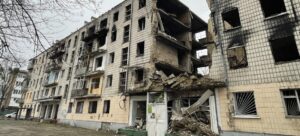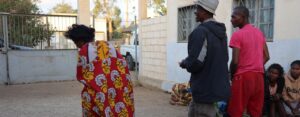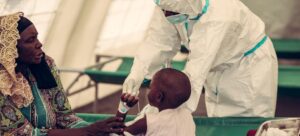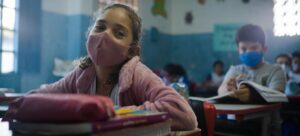“As we reflect on the two years of anguish and hardship, let us emerge from this place with a resounding message of solidarity and unwavering support to the resilient people of Ukraine,” he said, speaking on the eve of the solemn anniversary.
The Security Council is also set to meet later on Friday on Ukraine, where fresh strikes were reported on the cities of Odesa and Dnipro, just one day after deadly attacks in the Donetsk region, located in the east.
Destruction and devastation
Addressing representatives of the UN’s 193 Member States gathered in the General Assembly Hall in New York, Mr. Francis stated that they “can neither be blind to the ongoing destruction and devastation, nor ignore the plight of the people of Ukraine.”
UN_PGA
“This is especially so, because this year also coincides with the tenth anniversary of the 2014 attempted illegal annexation of Crimea and other Ukrainian territories by the Russian Federation,” he added.
Russia’s full-scale invasion began on 24 February 2022. Since then, thousands of people have been killed and injured, millions more uprooted, and schools, hospitals and other critical infrastructure damaged. Scores of Ukrainian children have also been forcibly deported to Russia.
Extensive impacts worldwide
Mr. Francis said the impact of this “needless war” extends far beyond the borders of Ukraine as the environment is also “the silent victim of the conflict”, while the real risk of a nuclear accident persists.
“And, ultimately, the war has affected every Member State gathered in this hall – whether in the form of the soaring food prices or in the context of energy insecurity.”
Furthermore, the conflict has been a significant catalyst in reshaping global geopolitics and geoeconomics, he continued, as it is directly harming the countries involved while also impeding progress in many others, especially developing nations.
UN Charter undermined
“It is actively undermining the very foundations of our UN Charter – threatening the principles of sovereignty, and territorial integrity we all committed to hold dear and to defend,” he said.
“It has disrupted the delicate balance of international relations – at a time when unity, solidarity and cooperation are absolutely crucial to multilateral problem-solving.
Mr. Francis noted that while the 15-member UN Security Council has been paralyzed by division over the conflict, the General Assembly has condemned Russia’s aggression and demanded the immediate, complete and unconditional withdrawal of its forces from Ukrainian territory.
Work for peace
“Beyond condemnations, we, the United Nations, must actively work towards a comprehensive, just and sustainable peace in line with the Charter of this organization,” he said.
The Assembly President called for redoubling efforts “to end wars and usher in a future of hope, promise and prosperity for the people in Ukraine and Russia, alike – and indeed elsewhere, without exception.”

Bolstering healthcare in Ukraine
Meanwhile, UN agencies have been reflecting on their response to the conflict in Ukraine, which the World Health Organization (WHO) has called Europe’s largest emergency.
WHO has been partnering with the Ministry of Health to determine, in real-time, what the key needs of the sector are and step in where needed to bolster existing systems.
Support has included regularly donating essential medical supplies, vehicles, and equipment to ensure existing healthcare facilities can continue functioning.
Teams have also built temporary structures in communities where health facilities have been damaged or destroyed, thus ensuring that people can continue to receive care. Currently, 12 modular primary care clinics are open in locations across the south and the east of the country.
WHO has verified 1,574 attacks on health since the war broke out, claiming the lives of 118 of health care workers, and impacting health facilities, transport, and warehouses.

Concern for children’s mental health
Russia’s full-scale invasion has taken a devastating toll on the mental health of Ukraine’s youngest citizens, according to the UN Children’s Fund (UNICEF).
The agency said boys and girls in frontline areas have been forced to spend between 3,000 and 5,000 hours – equivalent to between four to seven months – sheltering in basements, bunkers, or a hole in the ground.
Seeking safety from missiles and drones is coming at a great cost for these children, said UNICEF Spokesperson James Elder who was in the city of Kharkiv this week, where he spoke to families and child psychologists.
“Around three-quarters of young people have recently reported needing some sort of psychological or emotional support; a fraction of those are getting it,” he said, speaking on Friday to journalists in Geneva.
“So, the ongoing shelling, the increased use of drones – all this is building into an awareness that children continue to be killed, and so it’s hindering families’ capacity to overcome the stress and trauma inflicted by this war.”
Mr. Elder added that despite education being a fundamental source of hope and stability, it is chronically disrupted and beyond reach for a substantial segment of Ukraine’s children.
“Children in frontline areas have been inside a school for a single week over the past four years – two years of COVID-19 and two years of full-scale war. In the Kharkiv region, two out of 700 schools are delivering in-person learning,” he said.
UNICEF’s response in Ukraine has included providing a network of psychologists who support children and their parents, helping them overcome distress and trauma and find some relief, some joy.
The agency also supports the rebuilding of critical infrastructure such as schools and water systems, among other operations.


















